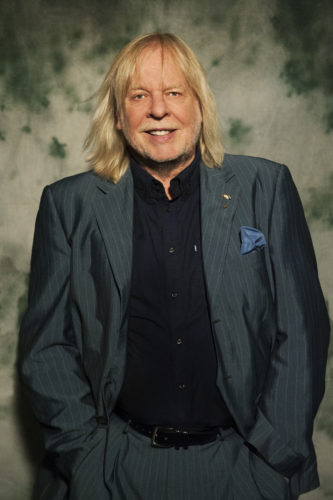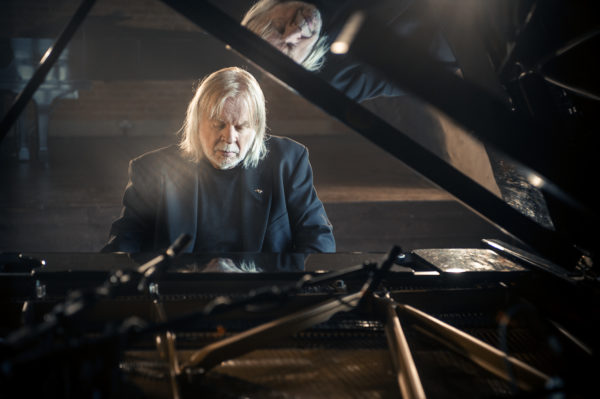Music Feature: Funny Tales and Flying Fingers — Keyboard Whiz Rick Wakeman Steps Out
By Jason M. Rubin
Prog legend Rick Wakeman is grumpy — becoming a septuagenarian means he can no longer party like it’s 1969.

Rick Wakeman will proffer songs and stories at the Wilbur on September 23. Photo: Deborah Anderson
In addition to complex (some would say bombastic) musical arrangements, progressive rock is a genre with a few highly iconic visual images. Twin- and triple-necked guitars, for example, as well as stacks of keyboards, massive drum sets, and the famous fat, flowing Yes logo. And then there’s the cape. If you ever see a musician on stage wearing a long, shiny cape, there’s an excellent chance that musician is Rick Wakeman. It’s as much a part of his fame as his agile fingers and mastery of multiple keyboard instruments, foundational to the most classic albums by Yes, one of progressive rock’s most successful and enduring groups.
Why a cape?
“We always wanted to make the stage more visually interesting,” says Wakeman of the early years of Yes, which he joined in 1971 after making his name as a session musician (Cat Stevens and David Bowie were among his clients) and serving a stint in a band called Strawbs. “This was a period of time when bands tended to dress down, but we felt that prog rock was more colorful than that, more theatrical.”
“The capes came about by accident,” he continues. “An article I’d seen described my stacked keyboards and pedals as a big spider. That sounded horrible. We later played a show in Hartford and the local DJ was wearing a three-quarters-length cape. He was a big man and that cape hid a multitude of sins. I offered him $200 for it, which was all I had in my pocket. Our lighting man, Michael Tait, said, ‘That’s great, but you need a full-length cape and one that will work better with lights.’ So he connected me to a woman who began making capes for me.”
You won’t see a cape on September 23, when Wakeman brings his Grumpy Old Rock Star tour to the Wilbur, however. This is a solo tour in which he plays piano exclusively. “Capes are too heavy on the arms for piano,” he says. “But for rock, I can’t imagine playing without a cape.”
The show will feature his versions of songs from throughout his career, including sessions (he played piano on Stevens’ “Morning Has Broken” and Bowie’s “Changes”), Yes, solo albums, and the typical, highly classified “surprises.” In between songs, Wakeman will regale the crowd with stories laced with his quick and often risqué wit (if you’ve seen his hilarious Rock & Roll Hall of Fame acceptance speech, you’ll know what to expect).
As it happens, Wakeman is a bit of a media sensation in the UK, hosting or guesting on various television shows, including the very popular Grumpy Old Men, a distinctly British show in which celebrities complain about things over which they have no control, and which of course provides the name of his tour. He’s also written books, including Grumpy Old Rock Star and Further Adventures of a Grumpy Old Rock Star.
What’s really funny, of course, is that at age 70, Rick Wakeman seemingly has nothing to be grumpy about. His two most recent albums — 2017’s Piano Portraits and 2018’s Piano Odyssey — charted well, showcasing classic rock hits with a classical touch, often in surprising ways, such as making the Beatles’ “Help” a ballad. Christmas Portraits is planned for later in the year. And yet, becoming a septuagenarian means he can no longer party like it’s 1969.
“Travel is the biggest problem,” he admits. “Playing is the equivalent of a runner running a race, it’s only when they’re done that they realize how tired they are. So I try to pace myself as best as I can. Back in the day, it was all about finding the next party. Now I order hot chocolate and watch a movie. Life has changed, but it doesn’t affect what I do on stage.”
Though Wakeman is undertaking a solo tour, he was recently active in ARW (for Yes alumni Jon Anderson, Trevor Rabin, and Wakeman), one of several Yes offshoot groups and personnel shifts that have arisen over the last several years. Fans are divided over what lineups are considered “legitimate”—though for the most part, all formations draw from the same core repertoire.

Rick Wakeman on the piano. Photo: UMC
“At the end of the day, the most important thing is the music,” he says. “Over the course of more than 50 years, there have been so many versions of Yes, so many different members, it’s quite remarkable. It’s hard for me to look at it objectively, as I’m more biased to those periods when I was involved. But I’m very respectful of the importance of the 90125 album, which was done at a time [1983] when prog was as popular as a sewage leak in a perfume factory. I wasn’t in the group then but if it wasn’t for that album and the work that Trevor Rabin put in to make it a hit, you probably wouldn’t be hearing Yes music today.”
In addition to releasing Christmas Portraits, Wakeman’s future plans include one more go-round with ARW in 2020 or 2021 before that group hangs it up. But the prog god won’t commit to retirement just yet, unlike original Yes drummer Bill Bruford, who retired in 2009 and has since earned a Ph.D. and written two books. (Wakeman and Bruford played in Yes together from 1971 to ’72 and were half of late-’80s Yes offshoot group Anderson Bruford Wakeman Howe, which briefly competed against another lineup that Bruford disparagingly called California Yes.)
“I saw Bill a few weeks ago,” says Wakeman. “I think very highly of Bill. I did a fundraiser for the village he lives in, and it was great to see him. He looked amazing. I said to him, ‘Bill you look so well, so fit, so healthy,’ and he said ‘That’s what retirement does.’ So there you go.”
Jason M. Rubin has been a professional writer for more than 33 years, the last 18 of which as senior creative associate at Libretto Inc., a Boston-based strategic communications agency where he has won awards for his copywriting. He has written for The Arts Fuse since 2012. Jason’s first novel, The Grave & The Gay, based on a 17th-century English folk ballad, was published in September 2012. His current book, Ancient Tales Newly Told, released in March 2019, combines in a single volume an updated version of his first novel with a new work of historical fiction, King of Kings, depicting the meeting of King Solomon and the Queen of Sheba. Jason holds a BA in Journalism from the University of Massachusetts Amherst.
